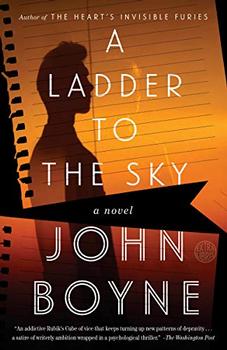Summary | Excerpt | Reviews | Beyond the Book | Read-Alikes | Genres & Themes | Author Bio

A Novel
by John BoyneThis article relates to A Ladder to the Sky
The main character in John Boyne's novel A Ladder to the Sky plagiarizes others' work to gain his fame and fortune.
 Many famous authors have been accused of "borrowing" the writings of others and claiming it as their own work, sometimes even ending up in court. Harry Potter author J.K. Rowling and Dan Brown, creator of the Robert Langdon series of page-turners, were both sued (unsuccessfully) and had to prove they did not appropriate someone else's stories to make their fortunes. Some acts of plagiarism, though, are not at all subtle and are without question the work of someone other than the acclaimed individual.
Many famous authors have been accused of "borrowing" the writings of others and claiming it as their own work, sometimes even ending up in court. Harry Potter author J.K. Rowling and Dan Brown, creator of the Robert Langdon series of page-turners, were both sued (unsuccessfully) and had to prove they did not appropriate someone else's stories to make their fortunes. Some acts of plagiarism, though, are not at all subtle and are without question the work of someone other than the acclaimed individual.
Helen Keller (1880-1968) became blind and deaf before the age of two due to an illness. Most know her remarkable story of working with a teacher, Ann Sullivan, to eventually learn to communicate, and going on to become a prolific and inspirational public speaker and author. Her act of plagiarism was early in her life, when she was only 11, and was very likely unintentional. She penned a story entitled The Frost King and sent it to Michael Anagnos at the Perkins School for the Blind. Anagnos was so impressed he had it published in the Goodson Gazette, a journal about deaf-blind education. It quickly came to light that the story was nearly identical to one authored by Margaret Canby, which had been read to Keller previously by Sullivan but which Keller hadn't remembered hearing before (a phenomenon referred to as cryptomnesia). Although it had no lasting effect on her career, it did cause a permanent rift with Anagnos and Keller was afraid to write creatively for years.
On the opposite side of the spectrum was T.S. Eliot (1888-1965), who actively encouraged plagiarism. He famously wrote in 1920 that "immature poets imitate, mature poets steal; bad poets deface what they take, and good poets make it into something better, or at least something different." A short while later, in 1922, he published The Waste Land, which contains multiple references to the work of other poets. He was accused of appropriating the work of others throughout his life, but he defended himself by saying that the references were in homage to the person he stole from, or just based on their works.
Author Alex Haley (1921-1992) published his book Roots in 1976, claiming that it was a compilation of his family's history. The book won both a Pulitzer Prize and the National Book Award in 1977. In 1978, however, author Harold Courlander sued Haley, claiming much of the work was based on his novel, The African, published in 1967. The case seemed proven and was going against Haley, at which point his lawyers decided it would be best for him to settle the case out of court; he ended up paying Courlander $650,000.
Primatologist Jane Goodall (b. 1934) claimed the plagiarism found in her 2012 book Seeds of Hope was the result of a "hectic work schedule" and "chaotic method of note-taking." The Washington Post accused her of lifting parts of it from websites, including, oddly, Wikipedia and astrology pages. The book was rewritten with proper attribution and re-released in 2014.
Lastly, award-winning historian Stephen E. Ambrose (1936-2002), author of well-known and well-regarded non-fiction titles such as Band of Brothers, committed an egregious act of plagiarism shortly before his death. His 2001 hit novel, The Wild Blue, copied whole passages, some verbatim, from a 1995 novel entitled Wings of Morning by Thomas Childers. When questioned about it, Ambrose claimed Wings was mentioned in the bibliography, and stated that he'd simply forgotten to correctly attribute the passages in question. Unfortunately for Ambrose this led to journalists digging deeper into his previous works and finding similar issues in seven of his books – as well as his college thesis.
by Kim Kovacs
Filed under Books and Authors
![]() This "beyond the book article" relates to A Ladder to the Sky. It originally ran in November 2018 and has been updated for the
August 2019 paperback edition.
Go to magazine.
This "beyond the book article" relates to A Ladder to the Sky. It originally ran in November 2018 and has been updated for the
August 2019 paperback edition.
Go to magazine.
Your guide toexceptional books
BookBrowse seeks out and recommends the best in contemporary fiction and nonfiction—books that not only engage and entertain but also deepen our understanding of ourselves and the world around us.